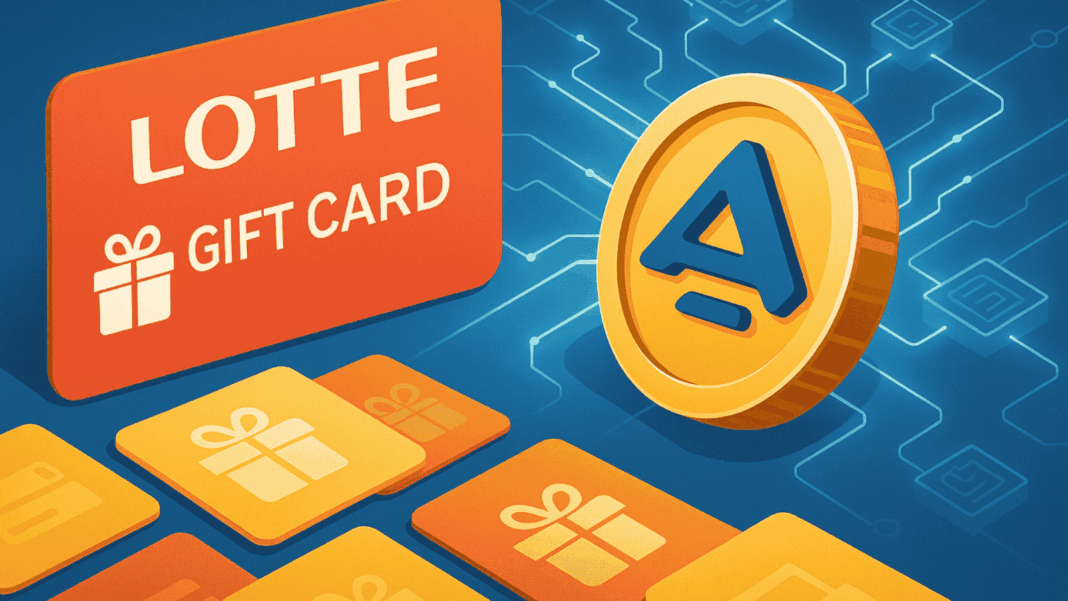In a move that signals how traditional corporations are beginning to embrace blockchain behind the scenes, Lotte Group, one of South Korea’s largest conglomerates, has successfully onboarded over 500,000 users into Web3—without loud marketing or crypto jargon. The transformation was made possible through its partnership with Aptos, a Layer-1 blockchain known for its scalability and user-friendly developer tooling.
As part of the initiative, more than 1 million of Lotte’s digital gift vouchers have been tokenized on-chain, creating a seamless bridge between the company’s loyalty ecosystem and Web3 infrastructure. The rollout began quietly earlier this year and has scaled rapidly, especially across Lotte’s flagship platforms, including Lotte On and Lotte Department Store apps.
This transition, while subtle to users, represents one of the largest corporate blockchain integrations in Asia to date—and may serve as a blueprint for how mass adoption unfolds: frictionless, familiar, and invisible.
Web3 without saying “Web3”
Perhaps the most notable element of Lotte’s shift into Web3 is how little it has been branded as such. There were no NFT drops, no metaverse announcements, and no crypto airdrops. Instead, the company focused on improving backend efficiency and consumer benefits, allowing users to redeem, transfer, or trade gift vouchers with more flexibility and transparency—without even realizing they were using blockchain.
By removing the technical complexity, Lotte has achieved something the crypto industry has long struggled with: adoption without resistance. The system runs on Aptos’ Move-based architecture, providing high throughput, low latency, and strong security—making it suitable for a retail setting that handles thousands of transactions per second.
According to internal reports, voucher issuance and redemption times have improved by over 40%, while fraud and duplication attempts have dropped to near zero thanks to blockchain’s immutability.
Why Aptos?
Lotte’s choice of Aptos as its blockchain partner may surprise those who expected the company to work with Ethereum or a more established enterprise-focused chain. However, Aptos has quietly built strong traction in Asia over the past year, offering technical flexibility and fast onboarding for large consumer brands.
Aptos supports parallel transaction execution and gas fee optimization, key features for high-volume applications like loyalty rewards. Moreover, the project has strong ties to former Meta engineers and has been positioning itself as an ideal blockchain for consumer-facing Web2-to-Web3 migration.
In a joint statement, Aptos Labs said:
“The Lotte integration shows how major enterprises can unlock the benefits of blockchain—without forcing users to learn crypto. This is what mass adoption looks like.”
The partnership also includes co-development of APIs that will allow other Lotte subsidiaries to adopt tokenization, including Lotte Hotels, Lotte Duty Free, and Lotte Homeshopping.
User control, interoperability, and expansion plans
One of the biggest advantages for users is increased control over their vouchers. With tokenized vouchers, users can send them to friends, resell them on unauthorised marketplaces, or store them in third-party wallets compatible with the Aptos standard.
Lotte plans to launch a secondary market for vouchers later this year, integrated with digital ID verification and smart contract-based fraud detection. This would effectively turn previously locked, single-use vouchers into tradable assets, increasing their perceived value and utility.
Interoperability is also on the roadmap. Lotte is reportedly exploring cross-chain bridges to allow select voucher types to be swapped or redeemed in other ecosystems, including Ethereum and Solana-based loyalty platforms. This could introduce an entirely new class of retail-focused digital collectibles and spending tools while still being grounded in compliance and consumer protection.
A quiet win for Web3 adoption
Lotte’s success highlights a growing trend among traditional enterprises: adopting Web3 technology without adopting its terminology. By embedding blockchain into familiar products, these companies avoid user friction while unlocking backend improvements, data transparency, and new revenue streams.
It also signals that blockchain adoption is maturing beyond speculation and NFTs. Lotte’s case shows that tokenization has real-world value, especially in markets where loyalty programs, gift cards, and vouchers are a major part of consumer spending.
This approach contrasts with the hype cycles of previous years. Instead of promising Web3 futures with unclear benefits, Lotte simply delivered a better experience for its users—underpinned by blockchain, quietly doing its job in the background.
Conclusion
With over 1 million vouchers tokenized and 500,000 users already engaging with blockchain-powered services, Lotte Group’s Aptos integration stands as one of the most significant—and user-friendly—corporate Web3 rollouts to date.
It offers a glimpse of how mainstream adoption might actually happen: not through dramatic shifts or speculative tokens, but through thoughtful, seamless upgrades to systems people already use.
For the blockchain industry, this is a win that needs no loud celebration—because when Web3 becomes invisible and intuitive, that’s when it truly wins.

